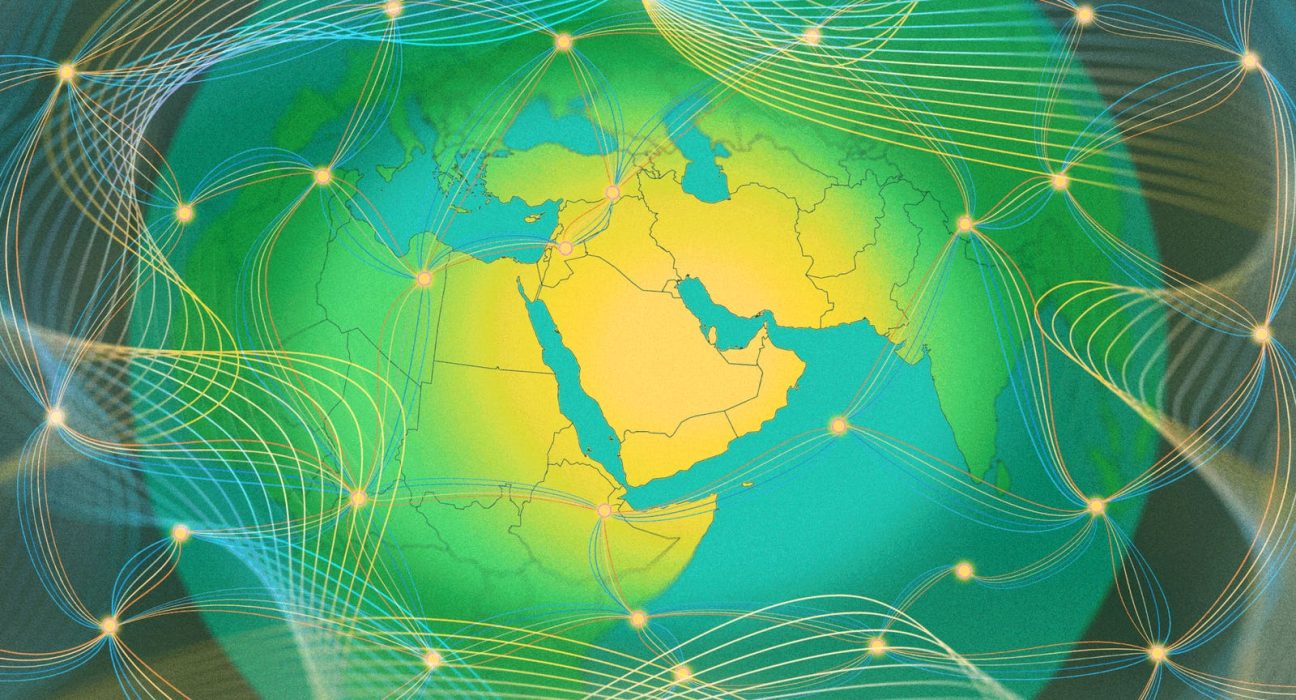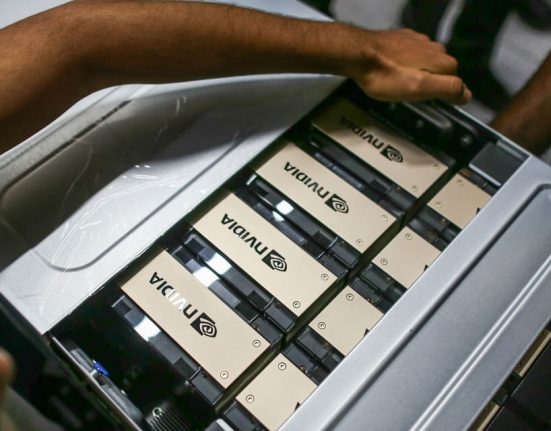illustration by angelica alzona for forbes; graphic by Natalja Cernecka/getty images
As the U.S. restricts chip sales to the region over China concerns, California-based Blaize is planning to go public via a SPAC backed by Middle Eastern investors.
By David Jeans, Forbes Staff
For more than a decade, a California-based semiconductor company launched by Intel engineers operated in obscurity, developing a chip that it hoped could put a dent in Nvidia’s edge computing business. But even after the company, Blaize, raised more than $200 million from venture capital firms like GGV and the tech investor Lane Bess, it was in need of more capital last year, and its existing investors were unwilling to provide more. “They came back to me and said, ‘Can you put more money in to keep us going?’” Bess, who has invested around $25 million, told Forbes. “And it was either that or we basically write down a loss.”
But last summer, a third option emerged: a group of Middle Eastern investors with a growing interest in AI. Led by Shahal Khan, who spearheaded the 2018 acquisition of Manhattan’s Plaza Hotel, the group was investing billions in AI ventures with an eye towards transforming the Gulf states into a preeminent tech hub. Blaize’s chips — which could provide edge compute power for anything from military drone footage to autonomous vehicles — would help bolster these ambitions.
Blaize CEO Dinakar Munagala
Blaize
Now, Blaize is set to go public via a SPAC merger with a blank check company led by Khan, BurTech, at an enterprise value of $894 million, and is expected to bring in $71 million in new capital, the company said last month; it expects to list on the NASDAQ in the second quarter of 2024. “The reason we invested in it really was that a lot of my LPs are from the Middle East,” Khan told Forbes, including the family offices of the royal families from Saudi Arabia, United Arab Emirates and Qatar. “And they’re investing a tremendous amount of money in building what they think is probably one of the major supercomputer hubs on the planet.”
Gulf sovereign wealth funds have long been funders for Silicon Valley startups and AI technologies. But as an American chip company, Blaize’s new ties to the region could present challenges at a time when the U.S. government is tightening semiconductor export controls to countries like Saudi Arabia, Qatar and the UAE amid concerns that China is using the region to circumvent American restrictions on obtaining the technology.
Other chipmakers, including Nvidia and AMD, have faced pressure from the government: In August the tech giants disclosed that the U.S. had restricted exports to undisclosed Middle Eastern nations (a spokesperson for the Commerce Department denied to Reuters that it had restricted sales). And in November, the White House reportedly expressed concerns about China’s ties to the UAE’s largest AI company, G42, which held major contracts with American companies like OpenAI. Recently, Bloomberg reported the Biden Administration forced a venture arm of Saudi Aramco to sell its position in a Sam Altman-backed AI startup called RainAI.
Blaize could find itself under similar scrutiny. “The U.S. government, including people like [the Committee on Foreign Investment in the United States], would have an interest and take a pretty close look at what they knew about this transaction,” said Brian Egan, an attorney at Skadden who advises companies on national security and issues before CFIUS.
Blaize’s CEO, Dinakar Munagala, emphasized that the company would adhere to American laws: “As a company, we have all of the export control processes in place so that when we sell our chips we are making sure that we conform to all the rules.”
The Commerce Department did not respond to a request for comment.
Blaize, which is headquartered in El Dorado Hills, California and has offices in the U.K. and India, has been busy signing deals in the Middle East. In September, the company announced it had entered a Memorandum of Understanding with Mark AB Capital, a fund controlled by members of Abu Dhabi’s royal family. The company said it expected to generate $50 million in annual revenue from the partnership through orders from the Gulf Cooperation Council, which includes the UAE and Saudi Arabia, and would train 5,000 UAE citizens on its AI software platform. “With this partnership, we’re not only harnessing AI’s potential, but also paving the way towards an AI-powered nation where progress knows no bounds,” Abdullah Mohamed Al Qubaisi, CEO of Mark AB Capital, said at the time.
“They’re investing a tremendous amount of money in building what they think is probably one of the major supercomputer hubs on the planet.”
Such deals are being done alongside a flurry of other AI technology partnerships in the region. In early 2023, California-based AI company Cerebras signed a $100 million deal to supply supercomputers to the UAE’s G42, which was followed by a partnership to develop a major Arabic-language large language model. Last month, India’s Adani Group reportedly formed a joint merger with the United Arab Emirates’ International Holding Co. to “explore artificial intelligence and other technologies.” And in the months leading up to his brief ouster as Open AI CEO in November, Sam Altman had reportedly been in talks to raise billions from Saudi Arabia and the UAE for a semiconductor company to rival Nvidia.
CEO Munagala told Forbes Blaize has customers beyond the Middle East, including the U.S., Japan and Germany, but declined to elaborate. He added that Blaize’s chips and software is being deployed at an undisclosed airport where it is being used to to sort through countless hours of security footage, and that the company is also targeting defense applications, such as providing compute for video analytics from drone footage; the company said it bid on at least one U.S. Department of Defense contract but declined to say more.
Launched in 2011 as ThinCI, the founding team was made up of former Intel semiconductor engineers, led by Munagala, who saw an opportunity to provide compute power for edge applications, such as compute-intensive tasks like video analytics. Strategic investors like Daimler and Japanese auto-parts giant Denso led funding rounds into the company, seeing potential in the company’s claims to run AI models more efficiently on its chips. After releasing its first products in 2020 — including an “AI studio” that enabled users to build AI applications without code, and multiple hardware platforms — the company raised another $70 million from investors like Franklin Templeton, GGV and Singapore sovereign wealth fund Temasek.
Now that Blaize has secured a new lifeline, Munagala is going on a roadshow to drum up hype ahead of the impending IPO. His first stop this month is Saudi Arabia, where Blaize is currently in talks to form a joint venture to deploy its chips in a new data center outside Riyadh and in drones used for agriculture. (A spokesperson for the contractor, Saudi National Projects Investments, did not respond to a request for comment). “Dinakar’s going to be pretty busy this month,” Khan said.
Bess, for his part, is relieved his investment has found new backers after its money-raising challenges. “Where the company found its footing,” he said, “is in the progressiveness of the Middle Eastern governments and royal families in having an appetite to invest in their future.”







